Canada Warns Citizens Against All Travel To Iran
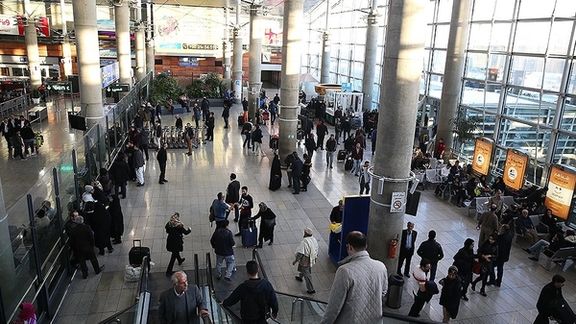
Canada has updated its travel advisory recommending against all travel to Iran, citing general security concerns and “the possibility of arbitrary detention.”

Canada has updated its travel advisory recommending against all travel to Iran, citing general security concerns and “the possibility of arbitrary detention.”
This is the highest risk level issued by Canada, stronger than current general advice to avoid all “non-essential” foreign travel due to the Covid-19 pandemic. “You should not travel to this country, territory or region,” the website states regarding Iran. “If you are already in the country, territory or region, you should consider leaving if it is safe to do so.”
The website points out the lack of a resident Canadian government office in Iran, and that the ability of Canadian officials elsewhere to offer consular assistance is extremely limited.
Canada broke off diplomatic relations in 2012, citing Iran’s support to the Syrian government, non-compliance with United Nations resolutions over the nuclear program, and fears for Canadian diplomats after protestors stormed the British embassy. Relations were not restored as Ottawa lifted most of its sanctions after the 2015 Iran nuclear deal.
According to the advisory, Canadians in Iran could face kidnapping and petty crimes, and women visitors facing sexual harassment. It adds that Canadians might be closely watched and that that innocuous behavior, such as taking photographs in public places or traveling beyond tourist attractions, could lead to investigation.
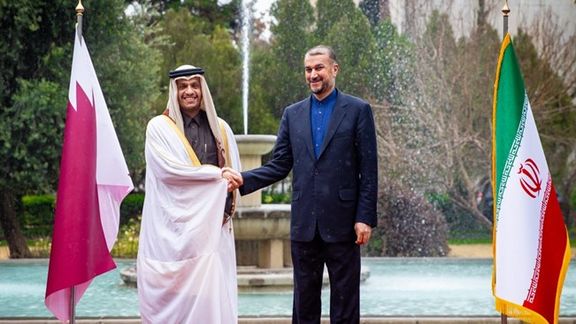
Iran's official news agency Thursday said the visit of Qatari foreign minister to Tehran should not be seen as facilitating direct talks with Washington.
Iranian Foreign Minister Hossein Amir-Abdollahian met his Qatari counterpart Mohammed bin Abdulrahman Al-Thani in Tehran Thursday morning, sparking suggestions in domestic and foreign media that Doha was working for direct US-Iran talks to help revive the 2015 Iran nuclear deal.
In a note headlined "Mistaken Interpretation Of Iran, Qatar Foreign Ministers' Visit," IRNA reported “good and close relations” with Qatar but said “speculation” over “direct talks with the US in Vienna,” where multilateral talks to revive the 2015 deal, had “fueled some misconceptions about the nature of the visit.”
The visit was announced Wednesday, two days after two calls between the two foreign ministers. "Two phone calls can be made when relations are close, developments fast, and the issue at hand important," tweeted Hamidreza Dehghani, Iran’s ambassador to Doha.
The IRNA note, published before the Tehran meeting, reiterated Iran’s stance that the central issue in reviving the 2015 deal, the JCPOA (Joint Comprehensive Plan of Action), was the US need to “return to its commitments” under the agreement, which Washington left in 2018 while imposing ‘maximum pressure’ sanctions.
The note stressed that until this happened a US “presence in the meetings of the Joint Committee [of remaining JCPOA members]” in Vienna would be “irrelevant,” and that “the key to solving the problem is [the US] returning to all commitments under the JCPOA, not mediation.”
IRNA went on to note both that some politicians in Iran had been arguing for direct US talks and that Qatari officials had not refuted speculation about mediation as "they want to gain credit" from posing as a mediator. With the meeting between Amir-Abdollahian and al-Thani focused on “regional” issues, IRNA observed, "Qatar's capabilities and record in this regard [mediation] do not confirm such an interpretation."
Among such regional issues are rising tensions over the United Arab Emirates role in the Yemen war, and recent Ansar Allah, or Houthi, missile attacks in the UAE.
But Qatar's emir Sheikh Tamim bin Hamad al-Thani is due to meet US President Joe Biden January 31, where restoring the JCPOA is likely to be discussed. Doha has called on both the US and Iran to respect the terms of the deal.
While Tehran has refused direct talks with the US since Washington left the JCPOA, and has insisted that the Vienna negotiations, which began in April, should remain formally within JCPOA structures with the US taking part indirectly, there have been recent signs that with Vienna process at a crucial point Tehran is reconsidering.
Talks remain controversial
Amir-Abdollahian said Monday that the possibility of bilateral talks with the US would not be "overlooked" if a "good deal with strong guarantees" was within reach. Ali Shamkhani, Secretary of Iran's Supreme National Security Council (SNSC), also raised the possibility in a tweet Tuesday. President Ebrahim Raisi in a TV interview Tuesday also appeared open, if hesitant, over the prospect.
But such talks remain controversial. The flagship hardliner newspaper Kayhan Tuesday criticized Amir-Abdollahian and Shamkhani, demanding an explanation.
Abdollah Ganji, chief editor of the principlist Jahan newspaper, has preferred to insist that any talks with the US should be bilateral and not within JCPOA structures.
While Raisi has continued approach of former president Hassan Rouhani over US participation in Vienna, some Iranian reformists have been recently pushed for direct US talks as the best way to have ‘maximum pressure’ sanctions lifted.
Ali Khamenei, the supreme leader, who endorsed two years of talks with the US leading up to the JCPOA in 2015 and earlier over Afghanistan and Iran, said in January that “negotiations with the enemy at a certain juncture does not necessarily mean surrender."
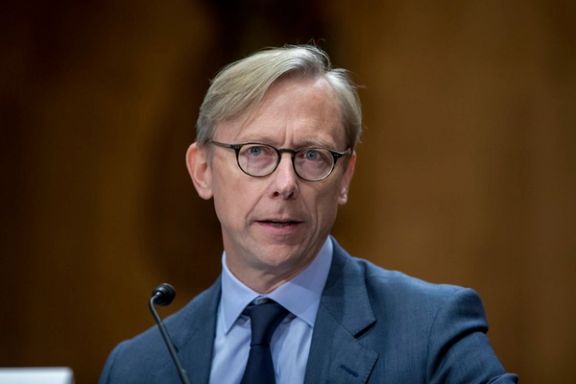
The US State Department has told Congress that a senior former diplomat faces "serious and credible" threats to his safety over the targeted killing of Iranian general Qasem Soleimani.
Brian Hook, former special envoy for Iran, faced threats after Iran vowed vengeance for a US drone attack that killed Soleimani in Baghdad in 2020.
The Washington Free Beacon said on Wednesday that the State Department delivered an unclassified but non-public assessment to Congress on January 11 about a campaign of public death threats aimed at former president Donald Trump and former top officials.
According to the report, "specific threat persists with respect to former special representative [for Iran] Brian Hook," who was instrumental in the operation to kill Soleimani and was at the helm of maximum pressure campaign on Tehran.
The document, seen by the Washington Free Beacon, does not name the actors behind the threats, describing them only as a "foreign power or the agent of a foreign power", but indicates that Hook has been under the threat since at least January 2021.
Earlier in January, a former Iranian diplomat now teaching at Princeton University touted threats against Hook in a documentary, saying, “An American told me that Brian Hook’s wife had not slept for several days and that she was shaking and crying”.
Iran has vowed revengefor its top military operator outside its borders and listed a host of US and Israeli officials as responsible for carrying out the attack.
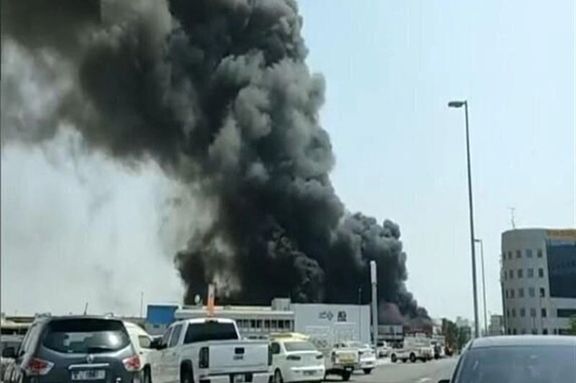
The leaders of the United Arab Emirates, Egypt and Bahrain met in Abu Dhabi after two attacks by Yemen's Houthi rebels targeted the city.
The state-run WAM news agency released the footage late Wednesday of the meeting. It saw Abu Dhabi's powerful Crown Prince Sheikh Mohammed bin Zayed Al Nahyan, Dubai ruler Sheikh Mohammed bin Rashid Al Maktoum, Egypt's President Abdel Fattah el-Sissi and Bahrain King Hamad bin Isa Al Khalifa all meet in Abu Dhabi.
Iran-backed Houthis launched a drone and missile attack on Abu Dhabi January 17, killing three foreign workers and launched a ballistic missile on January 24 that was intercepted by air defenses.
A communique released after the meeting said the leaders believe the Houthi "attacks pose a serious threat to regional and international security and stability and violate all international laws and norms."
These were rare attacks against the UAE, while Houthis have regularly targeted Saudi Arabia. UAE reduced its direct involvement in the Yemen conflict and is supporting local forces against the Hothis who have been making advances.
A Saudi-led coalition has been battling the Iranian-backed Houthis since March 2015 in a war that is seen as a proxy battle by the Islamic Republic against Persian Gulf Arab states.
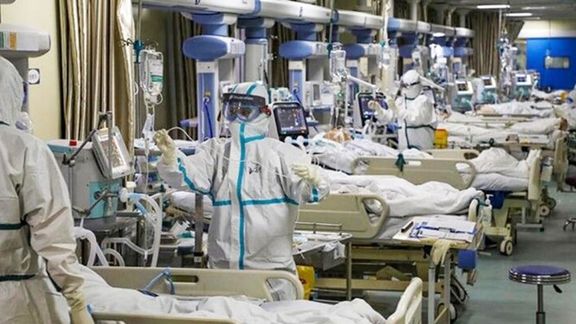
The Omicron variant is fast spreading across Iran, with an official from Iran’s Covid-19 taskforce, Hamidreza Jama’ati, predicting a peak in the next few weeks.
Another taskforce member, infectious diseases expert Payam Tabarsi, told ILNA news agency Wednesday that cases were increasing 40-50 percent daily.
Tabarsi noted it was too soon to say fatalities would be lower from Omicron, first reported in Iran December 19, than from earlier variants as most people infected at the beginning of each peak are young rather than the elderly or those with underlying conditions.
Cases reached 12,000 Wednesday, for the 24-hour period ending noon, up from 9,000 in the previous 24 hours, but the number of fatalities has remained in lower double-digits, well below the 709 peak of August 2021. Around 15 million Iranians have received a booster shot, and the government has announced plans to vaccinate nine to 12 year-olds.
While preliminary evidence worldwide suggests Omicron is less deadly than earlier variants it is also more contagious. The World Health Organization (WHO) this week warned of the danger of further variants and expressed scepticism at those countries, including the United States and the United Kingdom, lifting most restrictions.
Iran − which already has the highest official number of deaths and cases in the Middle East, 132,300 with 63 percent fully vaccinated, compared to 22,400 in Egypt with 26 percent fully vaccinated − is about to open schools. The government has also announced plans to hold celebrations, including rallies, for the anniversary of the 1979 revolution.
Numbers, fatalities
There have been many reports in Iran that there are far more deaths from Covid than officially recorded. In August, Kourosh Halakouei-Naeini, an epidemiology professor at Tehran University of Medical Science, claimed in Javan newspaper that the real figure was seven times higher – although the report served the principlist paper’s aim of undermining then president Hassan Rouhani.
Last week, BBC Persian suggested there had been at least 300,000 fatalities, while the United States think-tank the Atlantic Council published an article in December arguing deaths from Covid were 2.5 times higher than numbers announced by the health ministry.
The Albania-based opposition Mujahideen-e Khalq (MEK) claimed Tuesday that deaths in Iran from Covid were approaching 500,000. The group released a breakdown across 547 cities but gave no source nor explanation of methodology used.
Iranians in social media criticized Supreme Leader Ali Khamenei for banning American and British-made vaccines in early 2021, which they say increased infections and deaths last summer with the Delta surge. There were also suggestions that authorities played down the threat from Covid back in 2020 so as not to deter voting in the February parliament election and because Qom, home to many religious seminaries, was an early hot-spot.
As in many other countries, the management of the pandemic became a stick by which critics sought to beat the government, especially in Iran the health minister Saeed Namaki and Rouhani. By contrast, an increasing speed of vaccinations under President Ebrahim Raisi, who took office in August, has been widely highlighted by his conservative supporters.
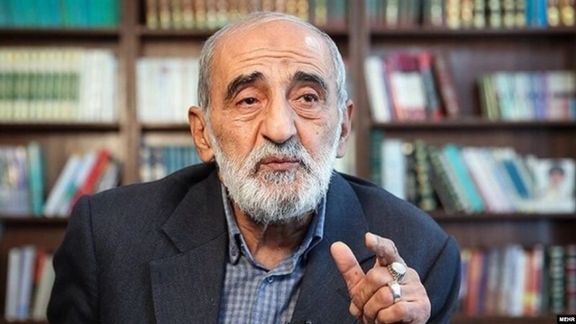
Nearly all 40 newspapers in Tehran carried welcoming reports about the idea of direct talks with the United States on Wednesday, that has grabbed the headlines.
Foreign Minister Hossein Amir-Abodllahian first hinted at the possibility on Monday and Supreme Council of National Security chief Ali Shamkhani echoed the same idea on Tuesday.
The exceptions were the hardliner Kayhan which is linked to Supreme Leader Ali Khamenei's office and ultraconservative Vatan Emrooz, a Paydari Party mouthpiece, which is the dominant hardliner group in the parliament.
The kayhan harshly criticized Amir-Abodollahian and Shamkhani for their support for direct talks with the Washington.
Last week, Kayhan and IRGC-linked Tasnim news agency had lashed out at Amir-Abdollahian for his support for a balanced foreign policy which meant having ties with the United States as well as Russia and China.
Vatan Emrooz totally had ignored the development while IRGC daily Javan avoided criticizing the foreign minister and the change was noticed by many social media activists in Iran.
The idea of direct talks was most recently brought up by US Special Envoy for Iran Robert Malley who responded to the Iranian side's call for a guarantee that future US governments will not pull out of a nuclear deal with Iran. Malley suggested that major US companies can be prompted to invest in Iran and in that case, they will prevent a US pull out from a new agreement.
Nonetheless, it was Khamenei himself who first mentioned the possibility of direct talks with the United States in a January 9 speech in which he showed the first public sign of his readiness for a compromise on the nuclear deal. His move was similar to his "heroic flexibility" speech in 2013 when he first agreed to negotiations with the United States. He said on January 9, "Negotiations with the enemy at a certain juncture does not necessarily mean surrender".
In a report that was published by Iran Diplomacy website on Wednesday, conservative commentator Jalal Khoshchehreh told the website that softening Iran's positions on holding direct talks with America was a change that followed President Ebrahim Raisi's visit to Moscow last week. Raisi himself, however, implied on live TV Tuesday night that direct talks are possible only if the United States lifts the sanctions on Iran.
As a result, Iranian newspapers came out Wednesday morning with three different messages about Tehran's approach to direct talks with Washington: The good, the bad and the ugly: Khamenei and Amir Abdollahian approving of direct talks with some hesitation, Raisi pending direct talks on the lifting of the sanctions, and Kayhan absolutely ruling out direct negotiations under any circumstances.
In a prominent headline on its frontpage on Wednesday the Kayhan said that "Direct talks is the enemy's trick to evade lifting the sanctions. Hossein Shariatmadari, the daily's firebrand editor wrote in his "brotherly advice to the foreign minister and security chief" that although they might be looking for water, they are misled to drown themselves in a mirage. Shariatmadari said he is worried that support for direct talks with the United States might disappoint the regime's devoted zealot supporters.
The anti-US editor then resorted to a piece of poetry from Iran's great poet Hafiz and quoted the 14th century mystic as saying: "This country is far from water, beware of the demons who lead you to mirage."